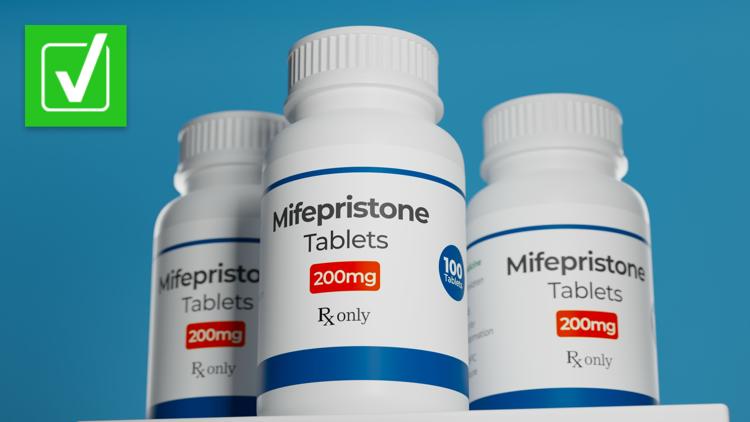Louisiana already has one of the strictest abortion laws in the country, banning the procedure at any stage unless a person’s life is in danger or the pregnancy is “medically futile.”
On May 24, Louisiana Gov. Jeff Landry (R) signed a bill into law that opponents say further restricts abortion access in the state.
The new law classifies the abortion-inducing drugs mifepristone and misoprostol as Schedule IV controlled substances, which is a category that already includes the opioid tramadol and a group of depressants known as benzodiazepines. It also creates the crime of “coerced criminal abortion by means of fraud,” which is when someone “knowingly” gives abortion-inducing drugs to a pregnant woman with the intent to cause an abortion “without her knowledge or consent.”
Under the law, a person who possesses mifepristone and misoprostol without a valid prescription in the state would face hefty fines and prison time. However, the law does exempt pregnant people from prosecution if they possess mifepristone and misoprostol without a prescription for their “own consumption.”
Some people online claim the new law also allows Louisiana to track people who get prescriptions for abortion medications in a registry or database.
THE QUESTION
Does a Louisiana law allow the state to track people who get prescriptions for abortion medications?
THE SOURCES
- Louisiana SB 276
- Louisiana Prescription Monitoring Program annual report from the state Board of Pharmacy
- Brief from the federal government’s Substance Abuse and Mental Health Services Administration
- Mary Ziegler, a law professor at the University of California Davis who is an expert in reproduction and health care
THE ANSWER
Yes, a Louisiana law allows the state to track people who get prescriptions for abortion medications.
WHAT WE FOUND
A Louisiana law known as SB 276 classifies the medications mifepristone and misoprostol, which can be used together to induce an abortion, as Schedule IV drugs under the state’s Uniform Controlled Dangerous Substances Law. The state tracks prescriptions for controlled substances in an electronic database.
Since mifepristone and misoprostol will be Schedule IV controlled substances once the law takes effect in October, Louisiana will be allowed to track information about people who get prescriptions for these drugs and their prescribers in the state database.
Controlled substances are classified into five distinct categories called schedules, which are based on the drugs' acceptable medical uses as well as their potential for abuse and dependency. Most states track prescriptions for Schedule II-V controlled substances, according to a 2017 report from the federal government’s Substance Abuse and Mental Health Services Administration (SAMHSA).
In Louisiana, an electronic database called the Prescription Monitoring Program (PMP) is used to “collect and monitor prescription data for all Schedule II, III, IV, and V controlled substances,” the state Board of Pharmacy said in a 2023 report.
Doctors need a special license to prescribe a Schedule IV drug. The state then tracks a patient’s identity, the prescribing doctor and the pharmacy that dispensed it, Mary Ziegler, a law professor at the University of California Davis who is an expert in reproduction and health care, told VERIFY.
This is typical of other states’ prescription drug monitoring programs, according to SAMHSA.
“Information collected typically includes date dispensed, patient, prescriber, pharmacy, medication and quantity. This information is submitted to databases in electronic form,” the agency’s 2017 brief says.
Doctors and pharmacists, as well as the state medical board, can look up a patient’s prescription history in the database, Ziegler said. Law enforcement can also access the information with a warrant.
Brittany Fonteno, president and CEO of the National Abortion Federation, expressed concerns about the new controlled substance designation allowing the state to “create a database of who’s receiving the drugs,” saying this could be “particularly frightening and dangerous for people seeking abortion care.”
Louisiana is the first state to classify mifepristone and misoprostol as controlled substances, and opponents of its new law say the drugs shouldn’t fall under this category.
That’s because medications are typically classified as controlled substances if they carry the risk of dependence and abuse. For example, anti-anxiety medications like Xanax, ADHD medications like Adderall and opioids are classified as controlled substances.
“The medications used in medication abortion do not fit this category, and they have an outstanding safety record,” Fonteno said.
Other medical experts, including the American College of Obstetricians and Gynecologists, agree that both mifepristone and misoprostol are safe and effective medications.
The medications also have other common uses outside of inducing abortions, the nonprofit Doctors for America says. They include treating miscarriages, inducing labor, stopping hemorrhaging and preparing the cervix for a range of procedures inside the uterus.
Louisiana Senator Thomas Pressly (R) pushed the legislation because of what happened to his sister Catherine Herring, the Associated Press reported. In 2022, Herring’s husband slipped her seven misoprostol pills in an effort to induce an abortion without her knowledge or consent.
“Federal law is clear that when a drug is frequently abused and is a risk to the health of citizens, it is appropriate to include it as a controlled substance,” Pressly said in a statement on April 30. “My sister’s story is clear proof that these drugs are being weaponized and are a risk to the public health. By placing these drugs on the controlled substance list, we will assist law enforcement in protecting vulnerable women and unborn babies.”
After signing the bill into law, Gov. Landry said in a statement that “requiring an abortion inducing drug to be obtained with a prescription and criminalizing the use of an abortion drug on an unsuspecting mother is nothing short of common sense,” adding that the bill “protects women across Louisiana.”
The Associated Press contributed to this report.



